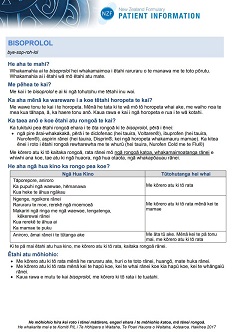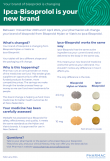If you're a frequent visitor to Healthify, why not share our site with a friend? Don't forget you can also browse Healthify without using your phone data.
Bisoprolol
Sounds like 'Bye-sop-roh-lol'
Key points about bisoprolol
- Bisoprolol is used to treat heart failure, high blood pressure and angina.
- Bisoprolol works by slowing down your heart rate and making it easier for your heart to pump blood around your body.
- Find out how to take it safely and possible side effects.

Bisoprolol is used to treat high blood pressure (hypertension) or to prevent chest pain (angina). It's also used with other medicines to treat heart failure. Bisoprolol works by slowing down your heart rate and making it easier for your heart to pump blood around your body. Read more about heart failure, high blood pressure and chest pain.
In Aotearoa New Zealand bisoprolol comes as tablets (2.5 mg, 5 mg and 10 mg).
- Always take bisoprolol exactly as your prescriber has told you. The pharmacy label on your medicine will tell you how much to take, how often to take it and any special instructions.
- The dose of bisoprolol will be different for different people depending what it is being used for and your response to treatment.
- Timing: Take bisoprolol once a day, in the morning. Swallow your tablet with a glass of water. You can take bisoprolol with or without food.
- Missed dose: If you forget your dose, take it as soon as you remember that day. But if it's nearly time for your next dose, just take the next dose at the right time. Don't take double the dose.
- Keep taking bisoprolol regularly: Treatment with bisoprolol is usually long-term. Don't stop taking bisoprolol suddenly. Talk to your doctor or nurse before stopping.
Here are some things to know when you're taking bisoprolol. Other things may be important as well, so ask your healthcare provider what you should know about.
- Avoid alcohol while you're taking bisoprolol, especially when you first start treatment. Alcohol can increase your risk of side effects, eg, dizziness.
- Bisoprolol can interact with other medicines. Tell your doctor or pharmacist about all the medicines you're taking including over the counter medicines, herbal and complementary medicines or recreational drugs.
If you have diabetes
- If you have diabetes, bisoprolol may cause changes in your blood glucose level. This effect usually settles with time.
- Beta-blockers may reduce the warning signs of a low blood sugar level (hypoglycaemia – often called a hypo). For example, you may not have the feeling of fast, irregular or strong heartbeats (palpitations) or tremor, which can occur when your blood glucose is going too low.
- If you're worried about this, talk to your doctor. Don't stop taking bisoprolol without checking with your doctor first. Read more about hypoglycaemia.
If you have asthma
- If you have asthma, taking a beta blocker may trigger your asthma symptoms or make them worse. Not everybody with asthma is sensitive to bisoprolol.
- If you're worried about this, talk to your doctor. They may be able to prescribe a different medicine or increase the dose of your asthma preventer medication.
- Don't suddenly stop taking bisoprolol without talking to your doctor first. This can be dangerous and make you feel unwell. Read more about medicines that may trigger asthma symptoms.
Like all medicines bisoprolol can cause side effects, although not everyone gets them. If you're concerned about any symptoms you think might be related to your medicine, talk to your healthcare provider. The following information offers some guidance but doesn't include all possible side effects.
Common side effects
Tell your healthcare provider if they bother you.
- Tiredness, headache, problems falling asleep or nightmares.
- Low mood.
- Nausea (feeling sick) or vomiting (being sick).
- Cold hands and feet, dry eyes, sexual problems.
- Dizziness, feeling lightheaded or faint when you stand up. This is quite common when you first start taking bisoprolol and usually goes way with time. Be careful when getting up from either lying down or sitting to avoid falls. These effects put you at risk of falls and injuries, especially if you're an older adult. Stand up slowly. If you do feel dizzy, sit or lie down for a few moments.
Tell your healthcare provider immediately or phone Healthline free on 0800 611 116 if these occur
- Changes in your heartbeat (feeling like it's too fast or irregular).
- Problems with breathing such as chest tightness, or wheezing or swelling of your ankles or feet.
Read more about medicines and side effects and reporting a reaction you think might be a side effect.
The following links provide further information on bisoprolol:
Bosvate(external link) Medsafe Consumer Information Sheet, NZ
Bisoprolol(external link) New Zealand Formulary Patient Information
References
- Bisoprolol fumarate(external link) New Zealand Formulary
Brochures

My Medicines, NZ, 2017

Ipca-Bisoprolol is your new brand
Pharmac, NZ, 2024

Medicines and side effects
Healthify He Puna Waiora, NZ, 2024
Credits: Sandra Ponen, Pharmacist, Healthify He Puna Waiora. Healthify is brought to you by Health Navigator Charitable Trust.
Reviewed by: Angela Lambie, Pharmacist, Auckland
Last reviewed:
Page last updated:





